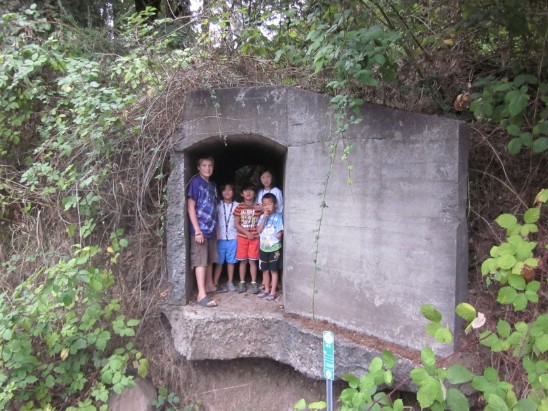Trip Notes - Geocaching
A high tech treasure hunt for modern day families
Aug 2010

Concealed in the Oregon wine country, this geocache was on the site of an abandoned fish hatchery. Caching teaches you little bits and pieces of history around the world and in your own community.
Geocaching is easy:
1) Visit geocahing.com and search for caches around where you are, or where you are going (or along a route that you'll be traveling).
2) Download those cache locations and descriptions to your GPS.
3) Select the location in your GPS and start navigating toward it.
4) When you get within a few feet, start combing the ground, trees, tunnels or other hiding places for the cache, then sign your name, trade goodies and you're off to the next cache.
A geocache can be anything from a microcache (film canister with a rolled up paper log) to a regular cache (ammo box or tupperware with medium sized knick-knacks to trade and a notebook to sign your name and write a note to a multi cache that is a series of two or more caches that build on one another with clues.
My recommendation to get started is:
Log on to geocaching.com, and sign up for a premium membership ($30/year). This unlocks features that make the game more fun, and the website is easier to use than typing in everything by hand- as well as supporting a real family oriented venture. Spend some time on this website to get familiar with the game. Everything you need to know is here.
Download easygps to manage your waypoints.
Purchase a GPS that allows 'paperless caching', which means that it can store the descriptions, hints, previous logs and photos so you can go on the hunt without printing and hauling around descriptions, and enjoy yourself.
Prepare a day pack that contains a whistle for as many people that will go with you- everyone gets one before you start hiking in the woods. Also inside, throw in some pens/pencils, tissues, water bottle, and a small collection of swag- the knick knacks that you'll trade when you find a cache. In our bag today we have small plastic animals, maps, pencils, antibiotic ointment, etc. Small, interesting stuff. Now, there's somewhere you can drop items you come across that would make great trade items, and you can get our the door quickly without running around the house to pack.
Visit our link page for a few more details, and links to these sites.
Want to learn more about RVing?
Read our Trip Notes and learn from our experiences- good & bad.
Trip Notes Index (click here)